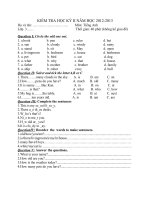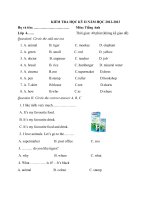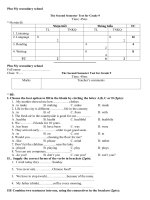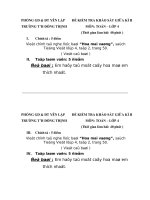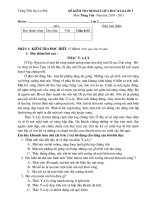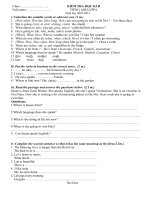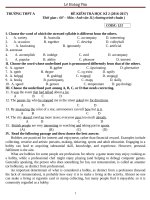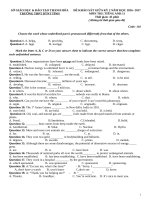ĐỀ KIỂM TRA GIỮA KÌ II TIẾNG ANH 11 GLOBAL SUCCESS
Bạn đang xem bản rút gọn của tài liệu. Xem và tải ngay bản đầy đủ của tài liệu tại đây (145.57 KB, 9 trang )
ĐỀ 1
ĐỀ KIỂM TRA GIỮA HỌC KÌ II
MƠN TIẾNG ANH – LỚP 11
Thời gian làm bài: 60 phút (không kể thời gian phát đề)
Họ và tên:………………………………………………………….. Lớp:…………………… Điểm:
A. LISTENING (2,0 ms)
Part 1: Listen to a nature radio programme and choose the correct answer. (0,25 * 4 = 1m)
1. Why was Phong Nha - Ke Bang recognized as a World Heritage Site?
A. It has existed over tens of millions of years.
B. It has distinctive flora and fauna.
C. It is a significant geological site.
2. Where is Phong Nha-Ke Bang located and how many kilometers from Hanoi?
A. In Ninh Binh, about 500 km south of Ha Noi.
B. In Quang Binh, about 500 km south of Hanoi.
C. In Quang Binh, about 500 km west of Hanoi.
3. Why can Phong Nha-Ke Bang be likened to a giant geological museum?
A. Because it has a complex geological structure with many different types of rocks.
B. Because of its relatively high geological structure and some rare gems.
C. Because of its high terrain, simple geographical structure and different type of rare rocks.
4. What year Phong Nha-Ke Bang was recognised as a World Heritage Site by UNESCO?
A. 2003
B. 2013
C. 2000
Part 2: Listen to a podcast about university life and fill in the blanks in each questions. (0,25 * 4 =1m)
5. The boy thinks you need to be a lot more _______________ in university.
6. The boy learned domestic skills such as how to do grocery shopping and _______________ in high school.
7. The girl thinks she needs to learn _________________.
8. Mr. Smith taught how to _______________.
B. PRONUNCIATION, VOCABULARY, GRAMMAR AND READING (6,0ms)
I. PRONUNCIATION
9. Mark the letter A, B, C or D to indicate the word whose underlined part differs from the other three in
pronunciation in each of the following questions.
A. heritage
B. temple
C. monument
D. sensor
10. Mark the letter A, B, C or D to indicate the word that differs from the other three in the position of the
main stress in each of the following questions.
A. debate
B. landscape
C. limestone
D. valley
II. VOCABULARY AND GRAMMAR
Mark the letter A, B, C or D to indicate the correct answer to each of the following questions.
11. Vietnamese takes pride in its rich cultural ____________, which includes traditional customs and practise
passed down through generations.
A. relic
B. heritage
C. pagoda
D. awareness
12. The ancient architecture of some buildings was constructed using ___________ due to its durability and
natural beauty.
A. compliment
B. sensor
C. limestone
D. crowfunding
13. Son Doong Cave is the biggest cave __________ in Phong Nha – Ke Bang National Park.
A. to be discovered
B. to discover
C discovering
D. which discovered
14. ___________ education is a popular choice for high school graduates who don’t go to university.
A. Academic
B. Vocational
C. Vocation
D Academy
15. The university requires all applicants to sucessfully pass he ___________ before gaining admission.
A. semester exam
B. general cardiovascular exam
C. regular tests
D. entrance exam
16. My parents were proud of having _________ the best schools in the area for me and my brothers.
A. chosen
B. choose
C. choosing
D. to choose
17. ____________ independent is not as challenging as some people may think.
A. become
B. becomes
C. becoming
D. becoming
18. I have gained my parents’ trust, an they believe that I’m ______ when I’m out and about.
A. interesting
B. dependent
C. self-motivated
D. resposible
Choose the answer to show the part that needs correction.
19. Using social media is good way introducing local heritage to the world.
(A)
(B)
(C)
(D)
20. His father didn’t who recommended the time-management app to Ha.
(A)
(B)
(C)
(D)
Mark the letter A, B, C, or D to indicate the word or phrase that is CLOSEST in meaning to the underlined
part in each of the following questions.
21. Many school-leavers choose to go to university o study academic subjects.
A. is a person who has graduated from a high school program.
B. is a school dropout.
C. is a university graduate.
D. are people who no longer go to school due to lack of qualifications.
Mark the letter A, B, C, or D to indicate the word or phrase that is OPPOSITE in meaning to the
underlined part in each of the following questions.
22. She was hoping that the Mediterranean climate would restore her to full health.
A. destructive
B. put back
C. bring back
D. get back
III. READING
Read the following passage and mark the letter A, B, C, or D to indicate the correct answer to each of the
questions.
MY 25,000 WONDERS OF THE WORLD
The coaches at the Uluru Sunset Viewing Area were parked three deep. Guides were putting up tables
and setting out wines and snacks. Ten minutes to go. Are we ready? Five minutes, folks. Got your cameras?
OK, here it comes ...
Whether an American backpacker or a wealthy traveller, Danish, British, French, we all saw that
sunset over Uluru, or Ayer Rock, in what seems to be the prescribed tourist manner: mouth full of corn chips,
glass full of Château Somewhere, and a loved one posing in a photo's foreground, as the all-time No 1
Australian icon behind us glowed briefly red.
Back on the coach, our guide declared our sunset to be 'pretty good', although not the best she'd
witnessed in her six years. Behind me, Adam, a student from Manchester, reinserted his iPod earphones:
'Well, that's enough of that rock.' Indeed. Shattered from getting up at five in order to see Uluru at dawn, I felt
empty and bored. What was the point? What made this rock the definitive sunset rock event? Why had we
come here? Well, I suppose my sons would remember it always. Except they'd missed the magical moment
while they checked out a rival tour group's snack table, which had better crisps.
So now I've visited four of the “25 Wonders of the World", as decreed by Rough Guides. And I think
this will be the last. While in my heart I can see myself wondering enchanted through China's Forbidden City,
in my head I know I would be standing grumpily at the back of a group listening to some Imperial Palace Tour
Guide. At the Grand Canyon I would be getting angr with tourists watching it through cameras – eyes are not
good enough, since they lack a recording facility.
As we become richer and consumer goods are more widely affordable, and satisfy us only briefly
before becoming obsolete, we turn to travel to provide us with 'experiences’. These will endure, set us apart
from stay-at-home people and maybe, fill our lives with happiness and meaning, Books with helpful titles like
1,000 Places to See Before You Die are bestsellers. I'd bet many backpacks on the Machu Picchu Inca Trail
are filled with copies, with little tieks penciled in the margins after each must-see sight has been visited.
Travel is now the biggest industry on the planet, bigger than armaments or pharmaceuticals. And yet viewing
the main sight of any destination is rarely the highlight of a trip. Mostly it sits there on your itinerary like a
duty visit to a dull relative. The guilt of not visiting the Sistine Chapel, because we preferred to stay in a bar
drinking limoncello, almost spoilt a weekend in Rome.
In Queensland, the Great Barrier Reef reproached us. How could we travel 15,000 miles without
seeing it? How would we explain back home that we were too lazy, and preferred to stay playing a ball game
in our hotel pool? In the end, we went to the reef and it was fine. But it won't rank highly in the things I'll
never forget about Australia. Like the fact that the banknotes are made of waterproof plastic: how gloriously
Australian is that? Even after a day's surfing, the $50 note you left in your surfing shorts is still OK to buy you
beer! And the news item that during a recent tsunami warning, the surfers at Bondi Beach refused to leave the
sea: what, and miss the ride of their lives? Or the stern warning at the hand luggage X-ray machine at Alice
Springs airport: "No jokes must be made whilst being processed by this facility' - to forestall, no doubt,
disrespectful Aussie comments: 'You won't find the bomb, mate. It's in my suitcase.’
The more I travel, the clearer it seems that the truth of a place is in the tiny details of everyday life, not
in its most glorious statues or scenery. Put down your camera, throw away your list, the real wonders of the
world number indefinitely more than 25.
23. What did the author think or feel after seeing the sunset over Ayer Rock?
A. She thought it was pretty good.
B. She felt exhausted, empty, and bored.
C. She thought that was enough.
D. She thought this rock was the definitive sunset rock event.
24 Why does she think that Uluru is probably the last 'wonder of the world' she will see?
A. She doesn't like wandering around the wonders.
B. She doesn't enjoy the Imperial Palace Tour Guide.
C. She doesn't like watching the wonder through a camera.
D. She doesn't want to explore the sites the way people around her do.
25. What kind of tourists is she criticising when she says 'eyes are not good enough' in paragraph 4?
A. those who stand grumpily at the back of the group
B. those who wander enchanted through the site
C. those who look at the wonders through their cameras
D. those who lack a recording facility
26. According to the author, what do a lot of backpackers carry with them nowadays?
A. books with helpful titles
B. books that are bestsellers
C. copies of must-see sights
D. little pencils
27 All of the following are mentioned in the article as memorable aspects of Australia EXCEPT ____.
A. banknotes made of waterproof plastic
B. the fine visit to the Great Barrier Reef
C. the surfers at Bondi Beach refusing to leave the sea despite tsunami warning
D. the stern warning at the hand luggage X-ray machine at Alice Springs airport.
Read the following passage and write the letter T (True), F (False) or Not given (NG) to indicate the
correct answer to each of the questions.
How to live independently is, probably, one of the questions that are most frequently asked by people, young
and old. According to experts, there are a number of steps that people who want to become independent
should follow. Below are some of them.
First, you should believe in yourself. That is the first and most important condition to make others believe in
you. If you don't have faith in yourself, you will always turn to others for help every time you have to make a
decision. Believing in yourself will make you trust your own decisions, even if they completely go against
someone else's.
Second, get your own information. You should watch and read the news from different sources. It's important
to read as much as possible, whether it is literature or daily newspapers. The information you get from reading
will allow you to get both sides of every story before you form an opinion.. Being well-informed will keep
you from being a follower and will lead to more independent thought.
Third, maintain solid friendships. You don't have to reject people as friends to be independent. .In fact, your
independence is reinforced with good friends. When your friend needs someone to talk to, be there for them,
and listen to their problems with sympathetic and understanding attitude. This way, you will not only help
your friends, but their stories will help you to learn how to deal with similar situations that may come up to
you later in your life.
28. You should believe in yourself so that other people will help you when you have to make a decision.
____________
29. If you believe in yourself, you won't be afraid that your decisions are different from those of other people.
____________
30. You should watch and read news on both TV and the Internet. _____________
31. When you have a lot of information, you can think more independently. _______________
32. There are four steps to become independent. ________________
D. WRITING (2,0ms)
I. Rewrite sentences (1.0m)
Combine the sentence, using to-infinitive clauses:
33. Linda joined career orientation extracurriculars at school. She was the first person who did so.
Linda ………………………………………………………………………………………
Rewrite these sentences, using perfect participle claues:
34. After they listened to an introduction of the course, they asked a lot of questions.
Having ……………………………………………………………………………………….
35.My brother finished school. Then he went to a university to continue her education path.
…………………………………………………………………………………………………
Rewrite following sentence, using cleft sentences focusing on the underlined parts.
36. My sister gets 50 dollars every week by doing household chores around the house.
It………………………………………………………………………………………………..
II. Write a paragraph (1m)
Write a paragraph (150 – 180 words) about pros and cons of self-study. Use the idea below to
help you.
Pros
Cons
- Self-study gives learners more freedom.
- Learners need more time to learn things.
- Learners become responsible.
- Learners may not develop certain life skills.
- Self-study makes learners confident.
- Learners may not learn practical skils.
……………………………………………………………………………………………………………………
………………………………………………………………………………………………………………
…………………………………………………………………………………………………………………
…………………………………………………………………………………………………………………
…………………………………………………………………………………………………………………
…………………………………………………………………………………………………………………
…………………………………………………………………………………………………………………
-------------- END -----------
SỞ GD&ĐT……….
TRƯỜNG THPT……………
ĐỀ KIỂM TRA GIỮA HỌC KÌ II – ĐỀ 2
MÔN TIẾNG ANH – LỚP 11
Thời gian làm bài: 60 phút (không kể thời gian phát đề)
Họ và tên:………………………………………………………….. Lớp:…………………… Điểm:
A. LISTENING (2,0ms)
Part 1: Listen to an interview about a visit to the Pyramids of Giza, a World Heritage Site and choose
the best answer (A, B, C or D).
1. What does Gordon say about his visit to the Great Pyramid of the Pharaoh Khufu?
A. It was empty inside.
B. It was easy to walk around it.
C. He couldn't take a good photo of it.
D. He took a small tour of the outside.
2. Gordon went to the Valley Temple of Khafre to see ____ .
A. its architecture
B. an ancient tomb
C. statues of the pharaoh
D. its long hallway
3. How did Gordon feel about the Sphinx?
A. He was disappointed that he couldn't get close to it.
B. He was impressed by its huge size.
C. He was surprised by how damaged it was.
D. He was excited about the picture he took with
it.
4. How many places does the man mention in the conversation?
A. 4 places
B. 5 places
C. 6 places
D. 3 places.
Part 2: Listen to what a tourist says about Ha Long Bay and decide whether the following statements
are true (T) or false (F).
5. More tourists have chosen to visit Ha Long Bay since UNESCO's recognition of its natural beauty.
6. There are 1,696 islands concentrated in the southeast and the southwest.
7. Thien Cung, Dau Go, Sung Sot, and Tam Cung are at the centre of the islands.
8. People who are interested in history should visit Van Don Island, Poem Mountain, and the Bach Dang
River.
B. PRONUNCIATION, VOCABULARY, GRAMMAR AND READING (6,0ms)
I. PRONUNCIATION
9. Mark the letter A, B, C or D to indicate the word whose underlined part differs from the other three in
pronunciation in each of the following questions.
A. duty
B. system
C. diary
D. identify
10. Mark the letter A, B, C or D to indicate the word that differs from the other three in the position of the
main stress in each of the following questions.
A. satisfaction
B. education
C. academic
D. particular
II. VOCABULARY, GRAMMAR
11. The new fashion collection is ____________ among young adults, many of whom are eager to try out the
latest styles.
A. developed
B. renewable
C. trending
D. unarrested
12. The moment when Neil Armstrong walked on the Moon is a ___________ one.
A. historic
B. history
C. historical
D. historically
13. My sister wants to go to the best university ____________ for a master's degree.
A. study
B. to study
C. having studied
D. has studied.
14. Many _______________ face the difficult challenge of choosing a career path after graduation.
A. dropouts
B. truant
C. adults
D. school-leavers
15. At _____________, they can do apprenticeships and learn from skilled people on the job.
A. vocational schools
B. universities
C. primary schools
D. high schools
16. Hoa regretted not having __________ the university entrance exam.
A. taking
B. taken
C. took
D. take
17. Learning effective ___________ skills is essential for becoming independent and managing your finances
responsibly.
A. time-management
B. money-management
C. skill-development
D. self-study
18. It was _______ taught me important life skills when I was at university.
A. Ms Mai whom
B. Ms Mai who
C. from Ms Mai that
D. by Ms Mai whom
Choose the answer to show the part that needs correction.
19. Ha Long Bay is the only heritage site in Vietnam to recognize twice by UNESCO.
(A) (B)
(C)
20. My father remembered having meeting the manager in his company
(A)
(B)
(C)
(D)
(D)
Mark the letter A, B, C, or D to indicate the word or phrase that is CLOSEST in meaning to the underlined
part in each of the following questions.
21. In order to safeguard our cultural identity, it is crucial to preserve our heritage for future generations.
A. protect
B. ruin
C. waste
D. destroy
Mark the letter A, B, C, or D to indicate the word or phrase that is OPPOSITE in meaning to the
underlined part in each of the following questions.
22. Being self-motivated is essential for becoming independent as it allows individuals to drive themselves towards their
goals without external influence.
A. autonomous
B. self-directed
C. driven
D. dependent
III. READING
Read the following passage and mark the letter A, B, C, or D to indicate the correct answer to each
of the questions.
Studying overseas is an experience that is exciting, rewarding, and challenging. Students that choose to
study abroad undergo a significant transition that requires a great deal of sacrifice, adaptability, and
determination. While studying overseas presents a great opportunity for students to learn about different
cultures, learn new languages, and experience new things, it is not without challenges, and several factors can
affect a student's ability to cope with and overcome these obstacles.
One of the biggest challenges of studying overseas is the issue of language barrier. Unless the student
is studying in an English-speaking country, they are likely to encounter difficulties with communication and
comprehension. The language barrier can make basic tasks such as ordering food and navigating through the
local area difficult, and can potentially be a huge obstacle to academic success. To overcome this challenge,
many students take language courses or enroll in language programs to learn the language spoken in their host
country. This helps them to communicate more effectively, make friends, and become more independent.
Another challenge that students face when studying overseas is culture shock. Culture shock can occur when
students encounter customs, beliefs, and ways of life that are different from those they are accustomed to. This
can make students feel disoriented, isolated, and homesick. To cope with culture shock, it is important for
students to keep an open mind, learn about the local culture, and immerse themselves in social activities.
Financial constraints can also pose a challenge to overseas study. Studying abroad can be expensive, and
students must be prepared to meet the financial demands of overseas education. Tuition fees, living expenses,
travel expenses, and other costs can add up quickly, and it is important for students to have a realistic budget
and financial assistance where necessary.
Additionally, logistics issues such as visas, flights, and accommodation can also present challenges to
studying overseas. These activities can be time-consuming and stressful, and students must be prepared to
research, plan, and navigate through these processes.
In conclusion, studying overseas can present a plethora of benefits to students, but also several
challenges. Language barriers, culture shock, financial constraints, and logistics issues are just some of the
challenges that students face when studying overseas. To cope with and overcome these obstacles, students
must be resilient, adaptable and willing to learn. With the right support and attitude, studying overseas can be
a life-changing experience that shapes an individual's personal and professional growth.
23. What is the main focus of the passage?
A. The benefits of studying abroad
B. The challenges of studying overseas
C. Tips for adjusting to a new culture
D. The financial implications of studying abroad
24. What is identified as one of the biggest challenges for students studying overseas?
A. Finding affordable accommodation
B. Adapting to different climates
C. Overcoming social isolation
D. Dealing with language barriers
25. How can students overcome the challenge of language barriers when studying overseas?
A. Engaging in cultural activities
B. Seeking financial assistance
C. Taking language courses or programs
D. Planning and budgeting effectively
26. Which of the following can be inferred from the passage?
A. Studying abroad is financially unattainable for most students .
B. Language barrier can make basic tasks difficult for students .
C. Overcoming culture shock involves learning about the local culture.
D. Logistics issues do not present challenges to studying overseas.
27. How can students effectively overcome the challenge of language barriers when studying overseas?
A. They can engage in local customs and traditions to improve communication.
B. They can enroll in language programs or courses to learn the host country's language.
C. They can avoid social activities to focus on language acquisition.
D. They can seek financial assistance to overcome language barriers.
Read the following passage and mark the letter A, B, C, or D to indicate the correct word or phrase that
best fits each of the numbered blank.
BANK ACCOUNTS FOR TEENS
To become independent, teens need to learn about financial responsibility. Managing a bank account provides
first-hand (28) _____________ and valuable lessons about saving and spending money.
First, do some (29) _____________ on banks in your area and choose one. Go to its website to find out the
different types of bank accounts and what you can use them for. Get some advice from your parents as well.
Then call the bank to make an appointment during office hours and go there to discuss your bank account and
fill in an application form. You will also need proof of your (30) _____________ and some money to put in
your new account. If you’re under 18, you may also consider having a joint account with a parent. This way,
your parents will be kept (31) _____________ about any activity in the bank account.
A bank account can teach you how to save and spend money. You’ll learn the value of money and get into the
habit of saving money. Try to regularly put pocket money, (32) _____________ gifts received for birthdays,
or any earnings from part-time jobs into your account, and watch your savings grow.
28. A. library
B. independence
C. responsibility
D. experience
29. A. learning
B. studying
C. research
D. planning
30. A. identity
B. information
C. birthday
D. character
31. A. learnt
B. informed
C. curious
D. managed
32. A. card
B. valuable
C. family
D. cash
D. WRITING (2,0ms)
I, Rewrite sentences (0,25 * 4 = 1m)
Combine the sentence, using to-infinitive clauses:
33. Marie wanted to go to Nha Trang city. Marie wanted to go swimming and eat seafood in here.
……………………………………………………………………………………………………………..
Rewrite these sentences, using perfect participle claues:
34. My brother had studied very hard, so he passed the exam easily.
……………………………………………………………………………………………………………..
35. I had considered my opinion very carefully, and I decided to study medicine and study at Ho Chi Minh
City University of Medicine and Pharmacy.
Having……………………………………………………………………………………………………..
Rewrite following sentence, using cleft sentences focusing on the underlined parts.
36. Good life skills can help students become more independent at university
It is…………………………………………………………………………………………………………..
II. Write a paragraph (1m)
Write a paragraph (100 – 140 words) about the benefits of academic study. You can use the
suggests below to help you.
BENEFITS OF ACADEMIC STUDY
- can earn more
- develop critical thinking skills
- develop research skills
- access to a wider range of career paths
- opportunities for academic research
……………………………………………………………………………………………………………………
……………………………………………………………………………………………………………………
…………………………………………………………………………………………………………………….
……………………………………………………………………………………………………………………
……………………………………………………………………………………………………………………
…………………………………………………………………………………………………………………….
……………………………………………………………………………………………………………………
……………………………………………………………………………………………………………………
…………………………………………………………………………………………………………………….
……………………………………………………………………………………………………………………
……………………………………………………………………………………………………………………
…………………………………………………………………………………………………………………….
……………………………………………………………………………………………………………………
……………………………………………………………………………………………………………………
……………………………………………………………………………………………………………………
……………………………………………………………………………………………………………………
…………………………………………………………………………………………………………………….
…………………………………………………………………………………………………………………….
……………………………………………………………………………………………………………………
……………………………………………………………………………………………………………………
…………………………………………………………………………………………………………………….
……………………………………………………………………………………………………………………
……………………………………………………………………………………………………………………
…………………………………………………………………………………………………………………….
----------------------- END ------------------------
ĐỀ 3
ĐỀ KIỂM TRA GIỮA HỌC KÌ II
MƠN TIẾNG ANH – LỚP 11
Thời gian làm bài: 60 phút (không kể thời gian phát đề)
Họ và tên:………………………………………………………….. Lớp:…………………… Điểm:
A. LISTENING (2,0ms)
Part 1. Listen to the podcast about Temple of Literature and decide whether the following sentences are
True (T) or False (F).
Statement
TRUE
FALSE
1. The construction of Van Mieu took place between 1076 and 1779.
2. Quoc Tu Giam is considered to be the first university of Vietnam.
3. Thousands of talented men were trained in Quoc Tu Giam from the 11 th to
the 18th century.
4. Van Mieu has now lost most of its traditional Vietnamese architecture.
5. Visitors can still see some trees which have been in Van Mieu for a long
time.
Part 2.

